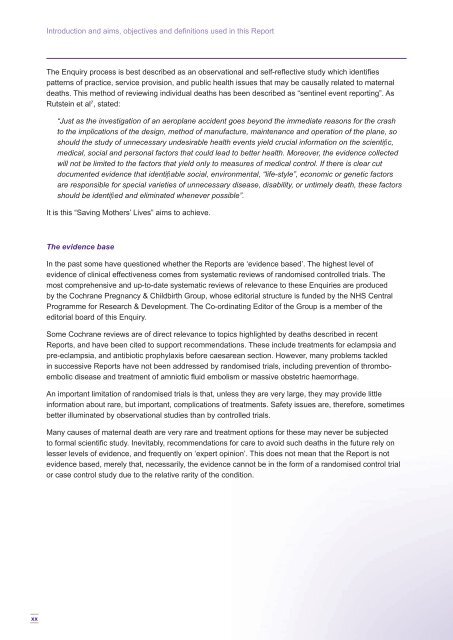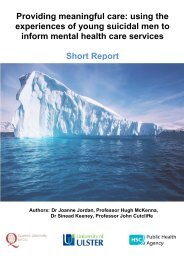Saving Mothers' Lives: - Public Health Agency for Northern Ireland
Saving Mothers' Lives: - Public Health Agency for Northern Ireland
Saving Mothers' Lives: - Public Health Agency for Northern Ireland
Create successful ePaper yourself
Turn your PDF publications into a flip-book with our unique Google optimized e-Paper software.
xx<br />
Introduction and aims, objectives and defi nitions used in this Report<br />
The Enquiry process is best described as an observational and self-refl ective study which identifi es<br />
patterns of practice, service provision, and public health issues that may be causally related to maternal<br />
deaths. This method of reviewing individual deaths has been described as “sentinel event reporting”. As<br />
Rutstein et al 7 , stated:<br />
“Just as the investigation of an aeroplane accident goes beyond the immediate reasons <strong>for</strong> the crash<br />
to the implications of the design, method of manufacture, maintenance and operation of the plane, so<br />
should the study of unnecessary undesirable health events yield crucial in<strong>for</strong>mation on the scientifi c,<br />
medical, social and personal factors that could lead to better health. Moreover, the evidence collected<br />
will not be limited to the factors that yield only to measures of medical control. If there is clear cut<br />
documented evidence that identifi able social, environmental, “life-style”, economic or genetic factors<br />
are responsible <strong>for</strong> special varieties of unnecessary disease, disability, or untimely death, these factors<br />
should be identifi ed and eliminated whenever possible”.<br />
It is this “<strong>Saving</strong> Mothers’ <strong>Lives</strong>” aims to achieve.<br />
The evidence base<br />
In the past some have questioned whether the Reports are ‘evidence based’. The highest level of<br />
evidence of clinical effectiveness comes from systematic reviews of randomised controlled trials. The<br />
most comprehensive and up-to-date systematic reviews of relevance to these Enquiries are produced<br />
by the Cochrane Pregnancy & Childbirth Group, whose editorial structure is funded by the NHS Central<br />
Programme <strong>for</strong> Research & Development. The Co-ordinating Editor of the Group is a member of the<br />
editorial board of this Enquiry.<br />
Some Cochrane reviews are of direct relevance to topics highlighted by deaths described in recent<br />
Reports, and have been cited to support recommendations. These include treatments <strong>for</strong> eclampsia and<br />
pre-eclampsia, and antibiotic prophylaxis be<strong>for</strong>e caesarean section. However, many problems tackled<br />
in successive Reports have not been addressed by randomised trials, including prevention of thromboembolic<br />
disease and treatment of amniotic fl uid embolism or massive obstetric haemorrhage.<br />
An important limitation of randomised trials is that, unless they are very large, they may provide little<br />
in<strong>for</strong>mation about rare, but important, complications of treatments. Safety issues are, there<strong>for</strong>e, sometimes<br />
better illuminated by observational studies than by controlled trials.<br />
Many causes of maternal death are very rare and treatment options <strong>for</strong> these may never be subjected<br />
to <strong>for</strong>mal scientifi c study. Inevitably, recommendations <strong>for</strong> care to avoid such deaths in the future rely on<br />
lesser levels of evidence, and frequently on ‘expert opinion’. This does not mean that the Report is not<br />
evidence based, merely that, necessarily, the evidence cannot be in the <strong>for</strong>m of a randomised control trial<br />
or case control study due to the relative rarity of the condition.



